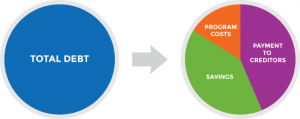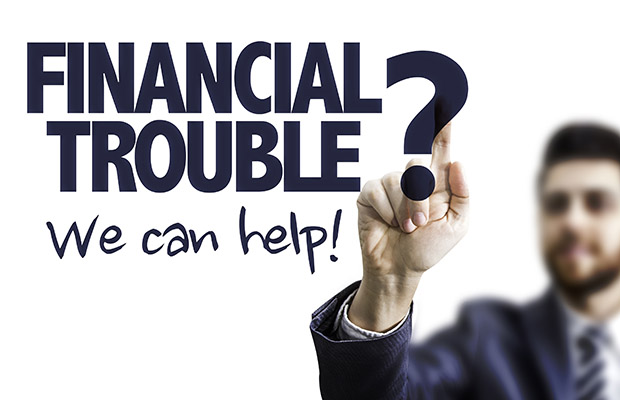Negotiating With Creditors Reduces Your Balance – Not Just Your Interest Rate

Instead of being stuck with a credit counseling or debt management plan for 5 years, a good Debt Settlement Program can settle your debt in 3 years or less depending on the pace at which you fund the program. Also, you can save thousands of dollars in principal and interest payments through Debt Settlement when compared to other debt reduction options.
The Advantages of Debt Settlement
- BETTER THAN BANKRUPTCY. Provides an ethical and honorable alternative for those who face bankruptcy.
- PRIVACY. Debt settlement allows you to maintain privacy over your financial affairs (unlike bankruptcy, where everything becomes a matter of public record).
- CONTROL. Lets you take charge of the program and control your own destiny (unlike bankruptcy, where the courts decide everything).
- SPEED. Gets you debt free faster. Typical debt settlement programs have a duration of only 2-3 years versus 5-9 years or more for Debt Consolidation or Credit Counseling.
- LOWER OVERALL COST. Debt settlement ultimately requires the lowest total payout versus debt consolidation or credit counseling.
- FLEXIBILITY. Provides the most flexibility of any program in terms of monthly budgeting. If you have to miss a month your only penalty is that the program may take longer to complete. You can also “make it up” down the road by funding over and above your basic level.
Get a free debt analysis to find out if you qualify for debt settlement.
How does the settlement process work?
The goal with debt settlement is always to significantly reduce the amount that must be paid back. Negotiation experience helps, and so does having enough capital to make a lump-sum offer.
The first thing a debt settlement company will do is consult with the lender who initially provided the loan. If the account is more than six months overdue, the debt may have been turned over to a debt collection firm whose only real goal is to siphon as much cash as they can from the debtor.
You will be asked to start making monthly deposits into an escrow account to build a savings. When enough capital has been secured to settle the debt, then it’s time to make a deal. This part of the process requires patience. If the financial institution accepts, get it in writing. Additionally, ask the creditor to send the settlement agreement to the significant credit bureaus so that they understand the debt has been resolved.
What happens if lenders will not settle?
Creditors have no legal responsibility to work out a settlement on a credit card debt or other unsecured loan, but they are often able to recover more funds through debt negotiations than the alternatives such as a lawsuit or working with a collections agency.
What types of debts qualify for settlement?
Credit card debt is the most suitable for the debt negotiation process since the card company provider can get nothing with bankruptcy or other debt relief alternatives. The Board of the Federal Reserve states that over 7% of charge card debt was 90 days past due in Q4 of 2016. The Fed classifies these types of financial obligations as “seriously overdue,” which makes them qualified for debt settlement.
How Long Does Debt Settlement Stay on Your Record?
Debt settlement is a process of negotiating with creditors to reduce the amount of debt you owe. It can be an effective way to become debt free, but it does come with some trade-offs. One of those trade-offs is that your credit report will reflect the settlement for up to seven years from the date it was reported. The good news is that after seven years, the information will be deleted from your credit report, and you can start to rebuild your credit history. During this time, it’s essential to focus on making all of your payments on time and keeping a low balance on any revolving credit accounts.
Other Debt Relief Solutions
Do you feel that settlement may not be right for you? Debt settlement is not for everyone and there are other forms of debt relief that may help. Debt management plans, debt consolidation, and credit counseling are all possible alternatives to help relieve your debt.
Debt Consolidation
With a debt consolidation loan, a debtor takes on a single loan to repay smaller debts, often attaining a reduced rate of interest at the same time. If the sum is unable to be repaid after it has been consolidated into a single secured debt, then there may be few other options than bankruptcy.
Credit Counseling & Debt Management Plans
With credit counseling, a debt settlement company can establish low-interest financial obligation management plan so that a debtor can pay off their unsecured debt gradually. A debt management program (DMP) reduces your month-to-month payments so you can ultimately settle your debt completely without being buried by the burden of repayment in the short term. The downside to this form of debt relief is that it does little to reduce the overall sum of debt owed, unlike debt settlement.
Balance Transfers
If you have a significant amount of credit card debt, a balance transfer card may the right form of debt relief for you. A balance transfer is when you move financial debt from one credit card to another, generally to benefit from an introductory 0% interest rate deal on the new card. The downside is that they typically charge an additional fee to transfer the balance from one card to the other. This can lead to a significant, added cost.
To determine if an equilibrium transfer could work for your financial situation, check whether you’ll pay more loan on the interest settlements on your existing card than the cost of the balance transfer charges. With this form of debt relief, it is also important to pay the balance off prior to the card’s advertising period ends. Otherwise you will be charged interest on the debt, often from the start of when the debt was entered with that account.
Debt Relief Options at New Era Debt Solutions
Debt settlement is not for everyone. However, for those in the right circumstances, debt settlement can be a powerful path to financial freedom. Get a free debt analysis to find out if you qualify for debt settlement.

